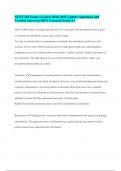Exam (elaborations)
NUFT 202 Exam 3 (Latest 2024/ 2025 Update) Questions and Verified Answers| 100% Correct| Grade A+
- Course
- Institution
NUFT 202 Exam 3 (Latest 2024/ 2025 Update) Questions and Verified Answers| 100% Correct| Grade A+ Ethics the study of conduct and character. It is concerned with determining what is good or valuable for individuals, groups, and society at large. Acts that are ethical reflect a commitment to sta...
[Show more]



